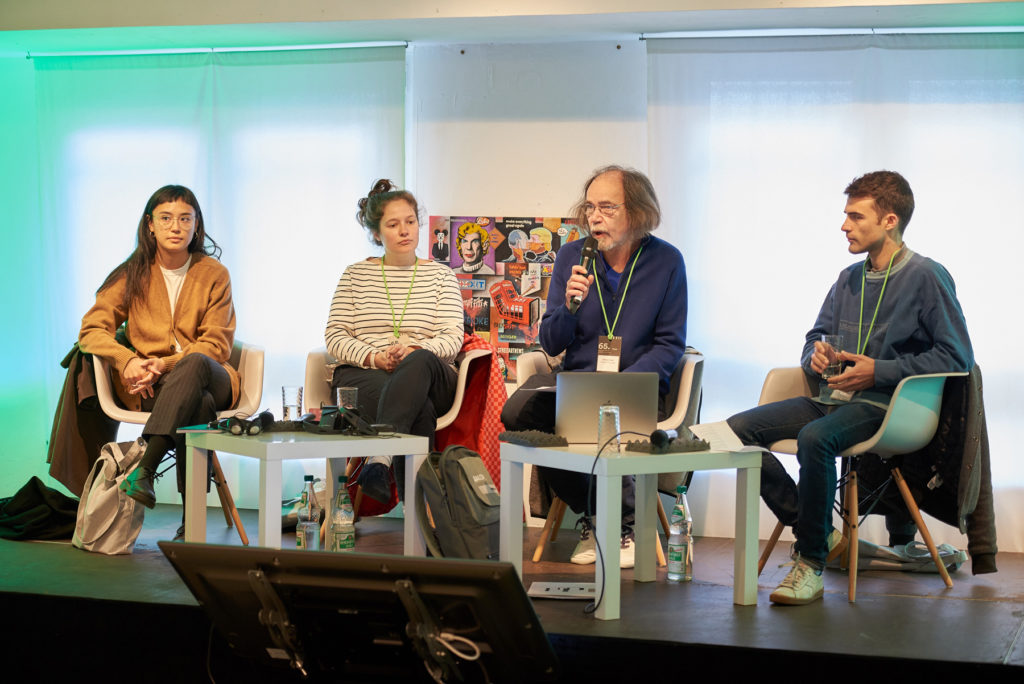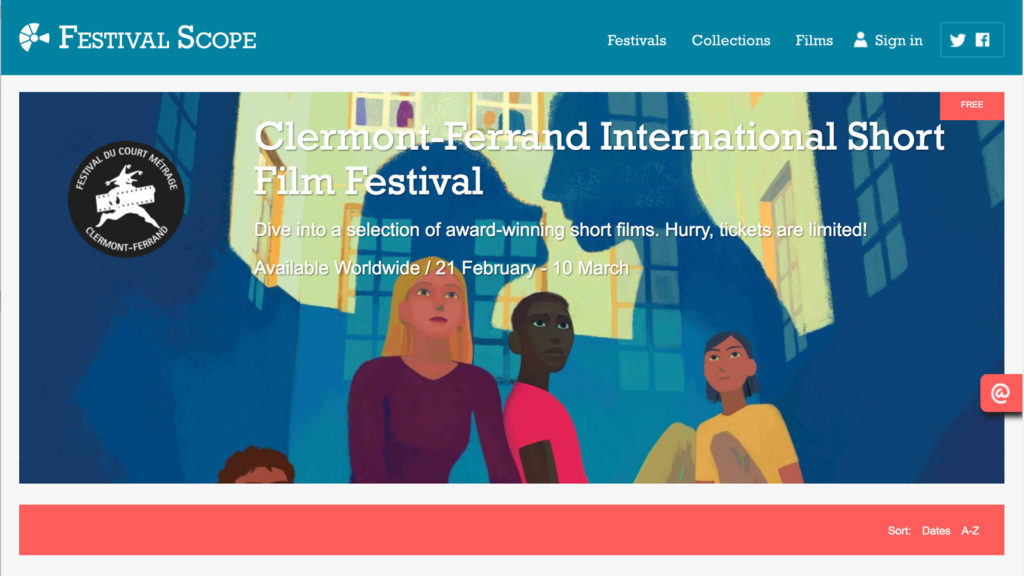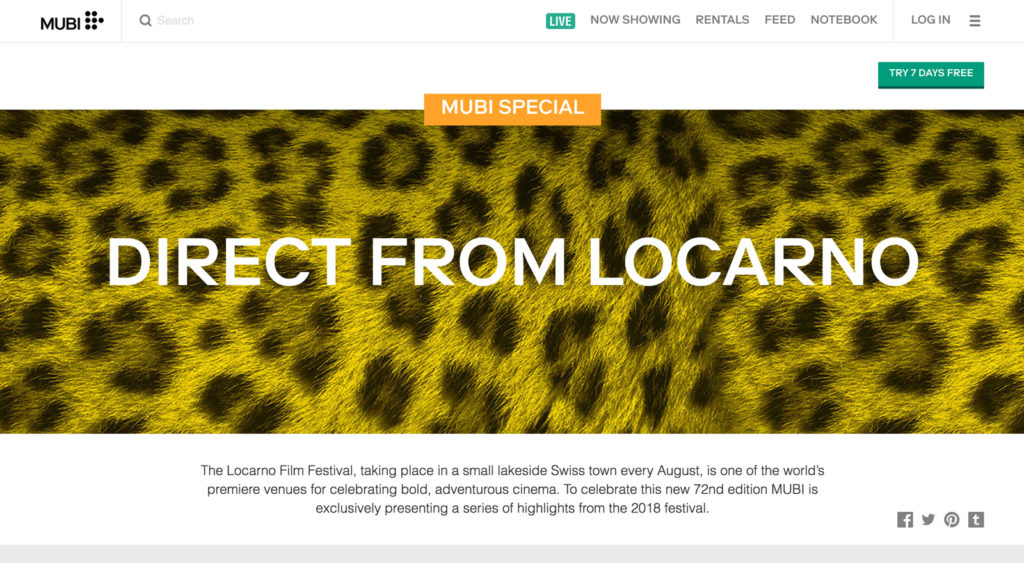
VoD-Podium Oberhausen 4 May 2019, from left to right: Margo Cayla (Festival Scope), Anaïs Lebrun (MUBI), Reinhard W. Wolf (Moderation), Giacomo Hug (Locarno Film Festival) © Kurzfilmtage / Daniel Gasenzer
Video-on-demand is a viable option for film festivals that want to extend their reach by offering users anytime, anywhere access to films on the internet. In this second part of our article on “Short film festivals and video-on-demand”, we look at collaborations with providers such as MUBI and Festival Scope, which have developed models specifically tailored to festivals and have already gained experience with festival short film programmes.
Operating a streaming platform is very complex and extremely expensive. Multimedia data cannot simply be posted for perpetual dissemination, like you would a PDF on your own website. In brief, three technical systems are required to prepare, deliver and distribute a video in adequate quality: a Content Provider System (CPS), a Service Provider System (SPS) and a Service Consumer System (SCS)[1].
In technical and organizational terms, platforms like Festival Scope and MUBI therefore relieve film festivals that want to present themselves and their film programme online of a great deal of work[2].
Festival Scope
According to its own public relations, Festival Scope[3] is the biggest European platform for film festivals. It includes the B2B platform Festival Scope Pro and the B2C platform Festival Scope. Of the approximately 3,000 films in the catalogue of both platforms, 30 to 40% are short films[4].
The Pro platform, which is not open to the public, is used for selling and promoting films. Registered film professionals can view films, discover new talent, contact rights holders and filmmakers, and view exclusive content from festivals and co-production markets.
While Festival Scope Pro targets the industry, Festival Scope is a streaming platform that offers viewers the opportunity to view films from international festivals. Access[5] to the professional platform is subject to a fee, while registration on the public platform is free of charge.

Screenshot Festival Scope 26 August 2019
Festival Scope has partnerships with more than 90 reputable film festivals, including short film festivals such as Clermont-Ferrand, Curtas Vila do Conde and Premiers Plans Angers. In contrast to classic video-on-demand platforms, it offers films only for a relatively short period of time. As a rule, they go online a few days after festival screening, for about two weeks.
Festival Scope also limits its streaming offerings in terms of quantity. In analogy to the limited seating capacity of a cinema, only a predefined number of virtual tickets are made available. Thus, only 200 to 500 people worldwide can enjoy access to a film within the given window of time.
Festival Scope sees this service as ‘Festival-on-Demand’[6] rather than video-on-demand”. In keeping with that metaphor, the characteristics of a festival are replicated virtually. This is also reflected in the fact that Festival Scope does not offer an extensive catalogue of film titles for free selection but only films in curated programmes. Strictly speaking, the streaming offerings are curated twice, because from the pool of films selected by the festival’s programme jury from all submissions, the festival and Festival Scope then make a second, narrower selection to be offered online.
MUBI
MUBI has been around a bit longer than Festival Scope. Its predecessor, “The Auteurs”, was founded in 2007 as a network for cinephiles[7]. In its early years, The Auteurs followed the model of a media library. It thus built up a library of titles in order to make important and interesting films, including classics, available to the public online. In many cases these were titles that were no longer available on the distribution market. This media library model was not economically viable, however, and was replaced by a rotation model.
With its new business model, MUBI is a pioneer of curated VoD offerings. The programme is similar to that of an art house cinema, except that there is a new film every day that can be watched anytime, anywhere for 30 days before it is replaced. MUBI accompanies its programme journalistically in the magazine “Notebook” and communicates with the community using commentary functions.
MUBI also offers film festivals a platform by way of specials. Featured in the past was for example the International Short Film Festival Oberhausen, although MUBI does not focus specifically on short film.
MUBI compiles its programmes in close cooperation with the respective festival. Besides taking into account curatorial aspects, it is also important not to spoil the future festival career of a film that may have just premiered through a premature online release. This aspect is also taken into consideration by Festival Scope. For the same reason, the Locarno Film Festival included older films that had already premiered at the festival in 2017 in its selection for its online “Shorts Weeks” in 2019.

Screenshot MUBI Special 26 August 2019
On MUBI, festival films, like all others, are only available online for 30 days. The films are not necessarily put online immediately after their festival premiere. For example, the titles competing at the International Short Film Festival Oberhausen in May 2019 only began to be released on MUBI starting in mid-June.[8]
Festival programmes involve extra effort for MUBI, because they don’t really fit into its structure. Visitors to the website will notice this when they try to find the Oberhausen programme or the films from a particular festival year using the MUBI user interfaces.
To facilitate such searches, MUBI would have to set up categories or special channels. Anaïs Lebrun[9] mentioned at the panel discussion on VoD in Oberhausen that the platform is currently considering doing just that. MUBI would then be able, for example, to compile collections from its existing repertoire or to offer special channels dedicated to film genres such as short film.
In any case, MUBI is interested in further cooperation with festivals. There is a very pragmatic reason for this: since MUBI is a curated streaming platform, it welcomes suggestions by festivals based on their previous experiences. Unlike with feature films, in the short film sector the expertise of festival programmers is in high demand. This is due to the boundless diversity of the short form and also not least to the sheer number of films made. Both factors make it difficult for the VoD platform’s staff to deal with short films on their own.[10]
Advantages of cooperation with VoD platforms
First of all, there are the costs. Working with a VoD platform eliminates the need for a festival to invest in its own asset management software and server structures as well as their maintenance. But using the services of a VoD platform of course comes at a price. Fees are charged for items such as marketing and technical costs. In addition, there is the cost of subtitling, which depends on geographical coverage, i.e., the number of languages and countries in which the platform is available. All in all, though, the expenses for film festivals are still much, much lower than the costs of building and maintaining their own platform architecture, an investment that would in all likelihood never pay off.
What’s more, each streaming platform has its own customer base, which is notified as festivals and films become available online. This multiplies the geographical and socio-cultural reach of a film festival compared to the usual reach of a local film festival and its followers.
Video on Recommand[11]
It is of course also possible, as the Locarno Film Festival has demonstrated with its “Shorts Weeks”,[12] to embed festival films hosted on a streaming service on the festival’s own website. But this can only be offered free of charge, without access restrictions and feedback. And festivals can only reach the group of people who visit the website and are already interested in the festival. Giacomo Hug, programme director of the Pardi di domani short film competition, pointed out that this strategy does however give the films and filmmakers greater visibility, while the festival benefits by giving both potential entrants and potential visitors an idea of the festival’s profile and an impression of the programme.[13] In the end, it also serves as a small consolation prize for interested viewers who are unable to attend the festival.
Nevertheless, festivals would be well-advised to take a multipronged approach and be present on several platforms. These may each have a different clientele and profile, or serve different territories. There are good reasons why the Locarno Film Festival offers films on both MUBI (Special, expired) and Festival Scope (9 to 31 August 2019) präsent.
The truth is that the platforms offering curated film programmes complement one another rather than competing. Such collaborations would scarcely be possible with classic VoD platforms that demand exclusivity and passively offer films for retrieval from a video library of thousands of titles.
Limited availability draws greater attention
It is actually quite a paradox to artificially restrict access to films on the internet of all places, whose advantages lie in permanent storage and constant availability. But in the unanimous opinion of the panel participants in Oberhausen, this is the very key to success.
Limiting the offering to a relatively short period of time and artificially restricting the number of viewers has a socio-psychological motivating effect – in keeping with a social media phenomenon known as “Fear of Missing Out” (FOMO). And scarcity of supply, as everywhere in the economy, adds perceived value.
The result is however that these models for limiting viewing time and viewer numbers do not fulfil film festivals’ objective of achieving a year-round extension of their reach and an ongoing presence on the internet. And yet curated VoD collaborations are still very advantageous for both festivals and filmmakers. They generate attention far beyond the festival’s own socio-cultural and geographical boundaries. Film festivals can use them to communicate their profile and the value of their work far and wide.
Success
The positive upshot, and for me this was the most surprising revelation of the panel discussion, is that short film is really successful on these platforms, unlike what is usually the case at the cinema or on television. The panel participants unanimously agreed – and the figures prove this – that short films in curated online programmes are more successful even than films in other genres. And this cannot be attributed to their briefer period of availability alone. We may instead presume that users’ penchant for convenience and the volatility of media content consumption on mobile devices give shorts a definite advantage over feature films.
Or their success is perhaps based instead on the particular form in which they are made available. Curated programmes are more attractive and trustworthy than a catalogue offering mostly unknown individual titles. The reputation of the festivals, which as programmers are at an advantage over anonymous aggregators in the usual commercialization chain, plays a key role here, as do the professional qualifications of the curators behind the programme selection. The cooperating platforms then contribute to the joint success with their own expertise in the area of audience building and with their technical support.
Reinhard W. Wolf
This article was inspired by a panel discussion at the International Short Film Festival Oberhausen in 2019[14]
A recording of the discussion is available as a podcast (Indiefilmtalk).
[1] The Content Provider System (CPS) generates multimedia data and applications such as encoding and transcoding, interactive playback features or multilingual subtitles. The Service Provider System (SPS) comprises content storage and its provision at the request of end users. Since a separate channel must be supplied for each VoD user in his or her own geographical vicinity, a Content Delivery Network (CDN), i.e., a network of powerful servers, is also required. Finally, the Service Consumer System (SCS) delivers content management functions that are tailored to the user’s specific end device and executed there. These include access and billing systems, digital rights management, feedback channels and the analysis of user data.
[2] VoD platforms, too, typically only manage the content-related area (CPS) themselves, leasing the other system services (SPS, SCS) from highly specialized companies.
[3] Festival Scope is owned by the Paris-based company Moving Scope SAS, founded in 2010 by Alessandro Raja, Mathilde Henrot and Lucie Kalmar to operate the B2B platform Festival Scope Pro.
[4] Information provided by Margo Cayla, Oberhausen, 4 May 2019.
[5] Registration at: https://pro.festivalscope.com/join
[6] Margo Cayla
[7] Originally launched in the UK, MUBI Inc. is now headquartered in the USA (Palo Alto, CA). The managing director is Efe Çakarel, founder of “The Auteurs”.
[8] See also “Competing at Oberhausen” https://mubi.com/de/specials/oberhausen
[9] Anaïs Lebrun, MUBI International Programming Director
[10] »I need help and cannot do everything by myself. So I need that network of people and festivals to help me to choose what would be the best film to show on the platform«, Anaïs Lebrun, Oberhausen 4 May 2019.
[11] »recommand is like a recommendation but you have no choice« (Urban Dictionary;-)
[12] In early 2019, the Locarno Film Festival offered on its website a new film from the 2017 Pardi di domani short film programme every day for a period of one month. The 27 films were available for viewing free of charge for one week each.
Locarno Shorts Weeks 14 February to 12 March 2019: https://www.locarnofestival.ch/pardo/festival-del-film-locarno/section-and-awards/sections/pardi-di-domani/shorts-weeks/shorts-weeks
See also: Short Film Magazine News, 1 March 2019: https://www.shortfilm.de/locarno-film-festival-startet-shorts-weeks-online/
[13] [14] “Video-on-Demand: New Opportunities for Filmmakers and Festivals?”, Oberhausen, 4 May 2019; participants: Margo Cayla (Festival Scope, Project Manager), Giacomo Hug (Locarno Film Festival, Pardi di domani Programming Office), Anaïs Lebrun (MUBI, Director of International Programming); moderator: Reinhard W. Wolf.
7 Trackbacks